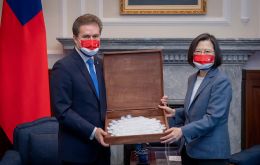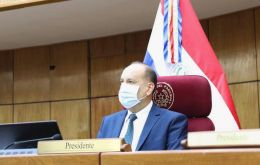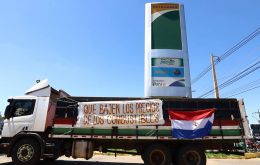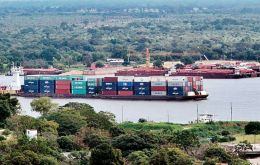MercoPress. South Atlantic News Agency
Paraguay
-
Friday, April 1st 2022 - 09:35 UTC
Paraguay, Taiwan sign new agreements to bolster mutual cooperation

Paraguay and Taiwan Wednesday signed in Taipei two memorandums on the prevention of African swine fever and the promotion of investment and exports, in addition to a letter of intent on industrial policy cooperation, it was announced.
. -
Monday, March 28th 2022 - 09:00 UTC
Paraguay changes into GMT-4 Daylight Saving Time

Paraguay has moved into “winter time” Sunday on the advice of the National Electricity Administration, which seeks to curb consumption. It has thus become the only Mercosur country living under a GMT (or UTC) -4 time zone, while Argentina, Uruguay, and Brazil are GMT -3.
-
Friday, March 25th 2022 - 09:22 UTC
Drought hits Paraguayan soybean production

Paraguay's meager output of soybeans this year will prevent it from capitalizing on soaring international prices, it was reported in Asunción.
-
Wednesday, March 23rd 2022 - 22:57 UTC
Heavy rainstorms in Asunción leave at least 3 people dead

After no casualties were reported initially following heavy rainfalls in the Paraguayan capítal of Asunción, fresh reports Wednesday mentioned that at least three people had died, in addition to houses and schools destroyed.
-
Tuesday, March 22nd 2022 - 21:58 UTC
German family of 17 deported from Paraguay due to lack of COVID-19 vax

Paraguayan authorities have deported a German family of 17 people who were all unvaccinated against COVID-19. They had sold all their assets to settle in the South American country, where other groups of European nationals have been reported to have migrated to avoid immunization mandates.
-
Monday, March 21st 2022 - 09:43 UTC
Petropar lowers price of fuel at pumps effective March 21

The price of fuel at pumps in Paraguay will be reduced as of Monday, the state-run company Petropar has announced.
-
Friday, March 18th 2022 - 20:35 UTC
Truckers relax measures but remain on strike over fuel price in Paraguay

Paraguayan lorry drivers have vowed to ease down their road-blocking measures after they were promised a reduction in the price of fuel.
-
Thursday, March 17th 2022 - 20:55 UTC
Paraguayan truckers to lift protests if stabilization fund bill is approved

A group of union leaders representing Paraguyay's lorry drivers Thursday announced they would lift the road blockades if the Senate passes the bill to create a fuel price stabilization fund.
-
Wednesday, March 16th 2022 - 09:00 UTC
Paraguayans against new increase to the price of fuel

Paraguayan consumers have taken to the streets to protest against the latest increase in the price of fuel at pumps, while unions have threatened to take additional measures if the government takes no action to help them through their new plight.
-
Saturday, March 12th 2022 - 10:00 UTC
Paraguayan exports in February show year-on-year growth

Exports of Paraguayan goods in the month of February of 2022 have surpassed those of the same month of the previous year, according to a Central Bank (BCP) report which also showed revenues had reached US$ 1,602.9 million.
